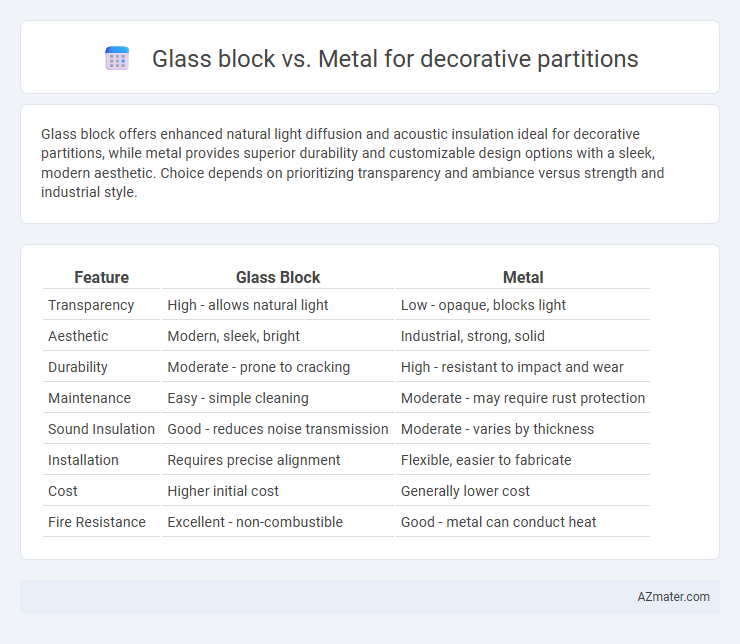Glass block offers enhanced natural light diffusion and acoustic insulation ideal for decorative partitions, while metal provides superior durability and customizable design options with a sleek, modern aesthetic. Choice depends on prioritizing transparency and ambiance versus strength and industrial style.
Table of Comparison
| Feature | Glass Block | Metal |
|---|---|---|
| Transparency | High - allows natural light | Low - opaque, blocks light |
| Aesthetic | Modern, sleek, bright | Industrial, strong, solid |
| Durability | Moderate - prone to cracking | High - resistant to impact and wear |
| Maintenance | Easy - simple cleaning | Moderate - may require rust protection |
| Sound Insulation | Good - reduces noise transmission | Moderate - varies by thickness |
| Installation | Requires precise alignment | Flexible, easier to fabricate |
| Cost | Higher initial cost | Generally lower cost |
| Fire Resistance | Excellent - non-combustible | Good - metal can conduct heat |
Introduction: Choosing the Right Decorative Partition
Selecting the right decorative partition impacts both aesthetics and functionality in interior design. Glass blocks offer translucency, natural light diffusion, and a modern, sleek appearance ideal for open, bright spaces. Metal partitions provide durability, customizable designs, and industrial or contemporary styles, making them suitable for high-traffic or minimalist environments.
Aesthetic Appeal: Glass Block vs Metal
Glass block decorative partitions offer a luminous, translucent aesthetic that enhances natural light diffusion and adds a sense of spaciousness, making interiors feel brighter and more open. Metal partitions provide a sleek, modern appearance with customizable finishes such as matte, polished, or brushed textures, delivering a bold, industrial edge to spaces. The choice between glass block and metal hinges on desired ambiance, with glass blocks promoting softness and light while metal emphasizes structure and contemporary sophistication.
Light Transmission and Privacy
Glass blocks offer superior light transmission, allowing natural light to diffuse softly while maintaining privacy through their translucent structure. Metal partitions, however, provide minimal light penetration but excel in creating solid, opaque barriers ideal for complete privacy. Choosing between glass block and metal depends on balancing the need for ambient lighting with the desired level of visual privacy in a space.
Structural Strength and Durability
Glass block partitions offer robust structural strength due to their interlocking design and thick, reinforced glass composition, making them highly resistant to impact and weathering. Metal partitions, often made of steel or aluminum, provide superior load-bearing capacity and long-term durability under heavy use but may require treatment to prevent rust and corrosion. The choice between glass block and metal hinges on the balance between aesthetic translucency and maximum structural resilience in specific architectural environments.
Sound Insulation Properties
Glass blocks provide superior sound insulation due to their dense, non-porous structure that effectively reduces noise transmission, making them ideal for decorative partitions in environments requiring privacy. Metal partitions, while durable and visually appealing, generally allow more sound passage because metal panels can conduct and amplify noise vibrations. Selecting glass blocks over metal enhances acoustic comfort, particularly in offices, hospitals, or residential spaces where minimizing noise pollution is crucial.
Installation Process and Flexibility
Glass block partitions require precise measurement and alignment during installation, often needing professional expertise to ensure stability and proper sealing. Metal partitions offer greater flexibility with modular systems that allow easy adjustments and faster assembly, often accommodating design changes without extensive reconstruction. The installation process for metal is typically less labor-intensive and more adaptable, making it ideal for spaces requiring frequent reconfiguration or customization.
Maintenance and Cleaning Requirements
Glass block partitions require minimal maintenance due to their non-porous surface, which resists stains and grime, allowing easy cleaning with standard glass cleaners and a soft cloth. Metal partitions, depending on the finish, may demand more frequent cleaning to prevent fingerprints, dust buildup, and potential corrosion, especially in humid environments; stainless steel and powder-coated metals generally offer better resistance. Regular maintenance for metal includes wiping with microfiber cloths and occasional application of protective coatings to preserve appearance and durability.
Cost Comparison: Glass Block vs Metal
Glass block partitions typically have higher upfront costs due to material price and specialized installation requirements, averaging $50 to $100 per square foot. Metal partitions, especially aluminum or steel options, offer a more budget-friendly alternative, generally costing between $20 to $60 per square foot, with faster installation and lower labor expenses. Maintenance costs for glass blocks are minimal but metal partitions may require periodic painting or rust treatment, impacting long-term expenses.
Sustainability and Eco-Friendliness
Glass blocks offer superior sustainability for decorative partitions due to their recyclability and ability to maximize natural light, reducing energy consumption. Metal partitions, while durable, often involve energy-intensive production and limited recyclability, impacting their eco-friendliness. Choosing glass blocks enhances environmental benefits by promoting daylight use and supporting circular material cycles.
Best Applications for Glass Block and Metal Partitions
Glass block partitions excel in environments requiring natural light diffusion and privacy, such as office lounges, bathrooms, and medical facilities, offering durability and noise reduction. Metal partitions are ideal for industrial and commercial spaces needing robust, customizable, and secure dividers, including warehouses, workshops, and retail stores. Both materials provide functional aesthetics, but glass blocks enhance illumination, while metal partitions prioritize strength and flexibility.

Infographic: Glass block vs Metal for Decorative partition
 azmater.com
azmater.com